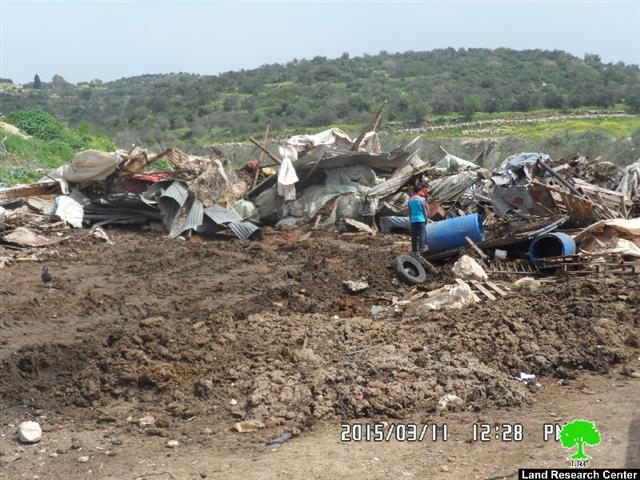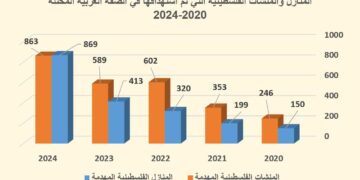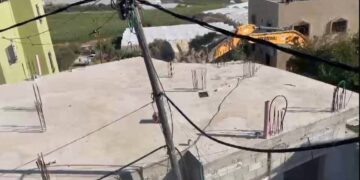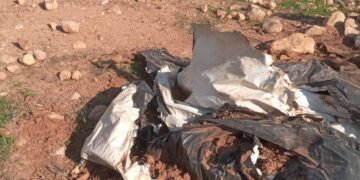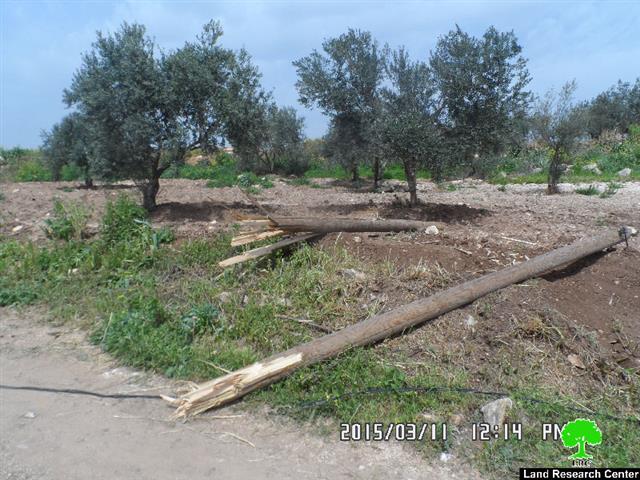Violation: destroying residential and agricultural structure
Date: 11/03/2015
Location: Zabda village-Jenin
Perpetrators: the Israeli occupation army
Victims: 3 Bedouin families
Details:
The seven month old Ahmad Abu Kbash and his family were not safe from the occupation's cruelty; the family house was demolished alongside with others' in the area for no reason where people were left homeless out in the cold.
It should be marked that a massive force from the Israeli occupation army accompanied by a military dozer on March 11, 2015 raided the area of Izbit Abu Kbash in the Jenin village of Zabda and asked the residents to evacuate their structures without any previous warning. The dozer then embarked on demolishing all barracks and tents of the location entirely.
It is indicated that the occupation demolished the village's power grid; damage reached out six electricity poles and the providing lines.
Mr. Ahmad Abu Kbash told an observer from Land Research Center the following: "the three targeted families were delivered stop-work orders on their residences and barns on May 20, 2014 under the pretext of unlicensed construction within area classified C according to Oslo Accords".
Photos 1-7: scenes of destruction after demolition
Abu Kbash community:
The residents of this community came originally from al-Samou' town ; the Israeli occupation confiscated their properties and lands in the aftermath of the 1948 war. Ever since, people had to move to the northern part of the West Ban; big part of them resided the area of Dhaher al-Abd, south of Jenin city where the rest settled down in the areas of Palestinian Jordan Valley.
In 1983, the family of Matar Abu Kbash rented a 5 dunum plot from Mr. Zaki Amarneh from Zabda. Since then, the residents of the area did not encounter any harassment until today's vicious attack. The following table shows information about the damage resulted due to the demolition:
|
Affected citizen |
Family |
Minors |
No. of sheep |
Targeted structure |
No. of previous order |
|||
|
Barrack animals tent |
Residential barrack |
Kitchen bathroom |
Other damages |
|||||
|
Matar Abu Kbash |
3 |
0 |
300 |
400m2 metal slaps barrack + 3 tents for sheep (100m2 for each) |
100m2 residential barrack |
702 kitchen+ one bathroom |
Death of three new born sheep |
|
|
Ahmad Abu Kbash |
15 |
8 |
80m2 residential barrack |
|||||
|
Waleed Abu Kbash |
7 |
5 |
100m2 residential barrack |
|||||
|
Residents of the community |
|
|
|
|
|
|
6 electricity poles+ 200m of power lines |
|
|
Total |
25 |
13 |
300 |
3 |
3 |
2 |
6 أعمدة |
|
Source: Field Observations – Monitoring Israeli Human Rights Violations- Land Research Center -2015
Land Research Center LRC sees that demolitions contradict with and violate all of the International conventions and Humanitarian laws including:
- Article 17 of the (1948) Universal Declaration of Human Rights stating: “Everyone has the right to own property alone as well as in association with others. No one shall be arbitrarily deprived of his property.”
- Section ‹G› of article 23 of the (1907) The Hague Conventions asserting: “In addition to the prohibitions provided by special Conventions, it is especially forbidden to destroy or seize the enemy's property, unless such destruction or seizure be imperatively demanded by the necessities of war.”
- Article 53 of the Geneva Fourth Convention (1948) declaring: “Any destruction by the Occupying Power of real or personal property belonging individually or collectively to private persons, or to the State, or to other public authorities, or to social or cooperative organizations, is prohibited, except where such destruction is rendered absolutely necessary by military operations.”
- Section 1, Article 11 of the International Covenant on Economic, Social and Cultural Rights (1966): “The States Parties to the present Covenant recognize the right of everyone to an adequate standard of living for himself and his family, including adequate food, clothing and housing, and to the continuous improvement of living conditions. The States Parties will take appropriate steps to ensure the realization of this right, recognizing to this effect the essential importance of international co-operation based on free consent."
Prepared by
The Land Research Center
LRC

